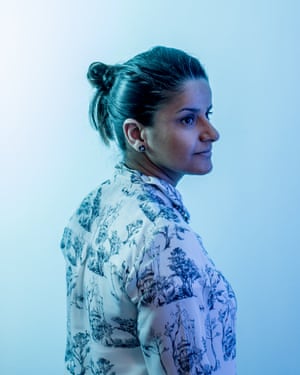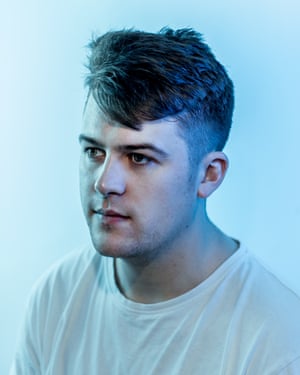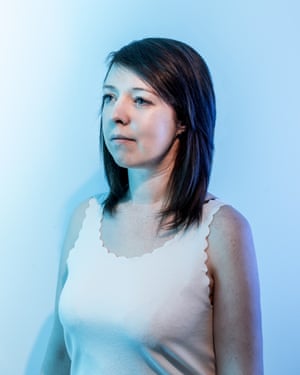'The smell of booze was part of the fabric of my childhood': the hidden victims of alcoholism
What’s it like to grow up the child of an alcoholic? One writer looks back at her teenage years, and talks to others about fear, shame and survival
George Clarke asked his father not to text him when he went on holiday to Valencia in September 2015; he didn’t want his father to be charged the extra fees. When Clarke, 25, landed back in the UK a week later, he headed straight to the restaurant where he worked as a waiter. His boss told him that one of his father’s neighbours had called while he was away – she was concerned about his father. Clarke had had messages like this before, and figuring his father was on one of his regular drinking binges, ignored her message. But two weeks later, the same neighbour called again. Clarke drove to his father’s flat, two miles from where he lived in Holmfirth, Yorkshire. No lights were on, and no one answered. He looked through a window and saw a loaf of bread on the kitchen counter that had turned blue and was surrounded by flies. He called the police.
“The next thing I knew, there was this big, 6ft 8in man covered in tattoos outside the flat with one of those battering rams they use in drug raids, trying to smash the door down,” Clarke says. “I had a chuckle to myself, as the whole moment was quite slapstick, and my dad would have laughed, watching these officers trying to knock his old wooden door down.” Once inside, the police found Clarke’s father upstairs. A postmortem later revealed he had been dead for three weeks.
Clarke has been grappling with that day since. “I get a heaviness in my chest when I talk about this,” he says. His parents divorced when he was 13; as a teenager, Clarke would visit his father two or three times a week with his two younger brothers, and spend the rest of his time with his mother. He remembers a time his father drove them to school, when Clarke was 15. “Looking back, I realise he was absolutely out of it. He was in a jovial mood, singing at the top of his lungs. And as a child I didn’t realise it was abnormal. The smell of alcohol was normal to me. It became part of the fabric of my childhood.”
Clarke would find bottles of alcohol hidden around the house; in the cereal cupboard, or the washing basket. He became estranged from his father when he stopped coming to his rugby matches, and missed his graduation from Newcastle University. “Everyone was there with their family. And I bought him a ticket and offered him a drive up, and he said he’d come, and then he went silent for a week,” he says. His father’s behaviour has affected his relationships. “You put your faith in someone,” he says, “but if you’re not sure that faith is 100% well placed, you get hurt over and over again. There’s a cynic in me that thinks, well my dad lied to me, so why shouldn’t someone else?”
***
Many children of alcoholics now have a dead parent, whether or not alcoholism is explicitly referenced on the death certificate. Alcoholism has long been recognised as a deadly disease, but there is far less awareness of its hidden victims: the children of alcoholics. A 2017 study by the University of Sheffield found that more than 200,000 children across England live with an alcoholic parent; other research has put the number of people in the UK affected by a parent’s problem drinking at 2.6 million.
I grew up in a home affected by alcoholism. My father, whom I never knew, suffered from alcoholism all his life. My parents divorced by the time I was six, and my mother raised me and my seven siblings alone. But she also battled with depression and alcoholism, and it swallowed much of the joy from her life. She died when I was 16.
Like many children of alcoholics, I tried to reason with my mother in an effort to stop her drinking. But when you’re 13, the last thing you want to be doing is begging a parent to stop hiding bottles of wine down the side of the bed, or spending your time persuading them that their life is, in fact, worth living.
Children grow used to an alcoholic’s many contradictions. My mother was a fiercely intelligent, empathetic person, who went from nursing in a mental hospital to completing a politics degree at the age of 40. I would love to inherit her good qualities, but I also don’t want to end up like the person she was at her weakest; when she had truly fallen victim to alcohol.
Children who were raised by an alcoholic parent share a bond; we are part of a club we never signed up to. My older sister thought that if people knew about our parents’ illness, our family would appear broken or dysfunctional. This went for me and some of my other siblings, too. For decades, we hid the true extent of our childhood experiences from others, because we just wanted to be “normal”.
Instead we have tried to live the best lives we can as adults, and supported each other. I am the third youngest, and my older siblings bore the brunt of my mother’s illness, shielding the rest of us. While he was at university, my older brother spoke to my mother on the phone every night and tried to talk her out of a depressive spiral. When she died, my older sister Mary, who was 22 at the time, became legal guardian to me, my younger sister and brother, who were 13 and 15. We might otherwise have been separated and put into care.
Today, some of my siblings drink, and some of them don’t. I enjoy social drinking. Since children of alcoholics are far more likely to become alcoholics themselves, I sometimes wonder how much our parents’ illnesses were hereditary, and whether we’re ever fully in control. While I’m confident I won’t develop a problem with alcohol, I have a solid support system around me, of good friends and family. But I’m not so sure things would have turned out this way without them.
Over the past year, there has been an increased focus on helping children of alcoholics. In April last year, the Department of Health and Social Care, and the Department for Work and Pensions, jointly announced £6m of funding. The plans include fast access to children’s mental health services, and programmes to treat parents’ addiction. The funding will also speed up the identification of children who are at risk, in the hope of reducing the numbers being taken into care. Stigma and shame have prevented many children from talking about the repercussions on their own health and wellbeing, but according to the National Association for Children of Alcoholics (NACOA), psychiatric problems such as post-traumatic stress disorder (PTSD), depression and bulimia are common.
I wanted to speak to others who grew up like me; to hear their stories, their coping mechanisms, and understand how they got through it.
***
As one of the few people of colour in a very white area of Sunderland, Bindy Galsinh tells me she often felt isolated, forced to grapple with her father’s alcoholism alone. “It felt like my brothers and I were the only brown people in the north-east of England at the time. And there was massive stigma in our [Sikh] community. All of my aunts and uncles knew about his problem, because when they’d visit us they’d see him drunk. But all of my family, even my grandmas, would act like: ‘That’s the way it is, keep it hush-hush.’”
When Galsinh’s father was drunk, he was aggressive and unpredictable. “He’d stay up and watch television all night. I remember when I was 10, I woke up to go to the toilet and was so scared of making any noise in the bathroom that I grabbed a pint glass, weed in it, and poured it down the sink.”
Galsinh was diagnosed with PTSD in her 20s. She suffers from flashbacks, nightmares, severe anxiety and depression. She compares growing up with an alcoholic parent to living in “a war zone”, because you never know what is coming. “We don’t develop like other people. We didn’t grow up with safety around us.” She feared being defined by her father’s alcoholism in the eyes of friends or family. “It’s the look that says, ‘There must be something wrong with you, because he wouldn’t drink this much.’ It’s worse than shame.”
Today, if Galsinh goes out, she has a drink. She chose not to be teetotal because she wants to prove she has control over alcohol, and does so with the support of friends. “To some weird degree, I drink because I want to feel closer to what he went through. I need to understand. You want to feel power over it.”
Galsinh’s father died in 2013. She says she feels guilty for not grieving for him. “I was grieving for myself. That I could have been more if I had the support. I was grieving for the fact I didn’t deserve any of that.” She has few happy memories of her father, she says, although, “He was the cleverest person I’ve ever met. If anything was broken he could fix it.”
***
My earliest memories of alcoholism being discussed in public life are in relation to the Liberal Democrat leader Charles Kennedy. To me, he seemed a committed politician, and as a 13-year-old who marched in protests against the Iraq war, I admired his stance on the issue. But his alcoholism was treated as a joke by the press and many of his peers, even after he stepped down from the leadership. On the comedy panel show Have I Got News For You, Jeremy Clarkson introduced Kennedy by saying: “On Paul Merton’s team tonight is a man who, after confessing to a drinking problem, reported that four party officials cornered him in his private office – although later it transpired that there were only two of them – Charles Kennedy!” In June 2015, Kennedy died after suffering a major haemorrhage caused by ongoing alcohol abuse.
Thankfully, times have changed. When Labour MP Jon Ashworth stood up in the Commons in 2017 to talk about his alcoholic father, the video of his speech went viral, and he was widely applauded for its honesty. Ashworth described how the shame his father felt about his alcoholism seeped into all areas of his life. “One of the most heartbreaking things for me was when I got married and my father felt he couldn’t come to the wedding because he would be so drunk. He felt there would be well-known politicians there, and my dad, from a working-class background, felt if he was there, drunk, he would embarrass me.” His father died in 2011.
On a grey morning, I meet Ashworth in his office at Westminster’s Portcullis House. He is welcoming and warm, and as we sit by his desk, he speaks passionately about the need for better services to treat alcoholism, and to protect NHS services. Though his voice softens when he recalls his childhood, he doesn’t shy away from the reality of his experience. “For too long, it’s been very difficult to talk about alcoholism,” he says. “People worry about speaking out because alcohol is such a huge part of our society, and nobody wants to be a killjoy. It’s almost as if it’s the final taboo.”
Ashworth, along with a cross-bench group of MPs, is leading an effort to tackle alcoholism and to better support the children of alcoholics. Almost all local authorities have seen cuts to drug and alcohol services that specifically support children, with a total of £8.3m slashed by 70 councils in 2017. Between 2015 and 2021, 95 local authorities are reducing their alcohol treatment and prevention budgets by £6.5m. Though the £6m in funding promised last April won’t make up the shortfall, Ashworth has praised it as a “real breakthrough”. The cash will be shared with charities and child helplines.
The All-Party Group for Children of Alcoholics is chaired by another Labour MP, Liam Byrne, also the son of an alcoholic. Its research has found that more than one in three deaths or serious injuries caused by neglect or abuse of a child are linked to parental drinking. Ashworth says his father was never physically abusive, but he still feels the shame that many children of alcoholics experience, even as adults. “By talking about my father, it’s as if I’m somehow betraying the memory of him, because I’m talking about his problems. People would say to me, ‘Isn’t he a great laugh, because he’s always drunk?’ We all like people who can be the life and soul of a party. But what happens at the end of it, when the band stops playing and the curtains are drawn and everyone goes, and it’s just me and him left alone in the house?”
Alcoholism is often portrayed as a problem isolated to poorer families, but Ashworth notes that alcoholics can often be high-functioning and hold down demanding jobs. “If you’re living in a chaotic household, the system is looking out for you. But there’s a whole cohort of children who will never get spotted because, on the outside, their parents are holding down respectable, middle-class jobs. My family was a working-class one – but even from the outside, no one would necessarily know there was a problem.”
Children of alcoholics are forced to grow up quickly, he says, and his mission is to let children of alcoholics know they’re not alone. “It doesn’t mean you can’t go on to do what you want in life. I have always wanted to be an MP and I achieved it.” He pauses. “Maybe that’s because I had to grow up quickly. And I want others to know they don’t need to suffer in silence.”
***
Kate Jones has her own set of rules for drinking alcohol: she doesn’t drink when she’s alone, before lunchtime, or when she’s sad. And she doesn’t drink to get drunk. “But sometimes I break them,” she says, laughing.
Jones grew up in a council home in Pill, a village just outside Bristol, with her parents and two younger brothers. Her father had a job as a forklift driver that involved shift work, but when he was signed off work with depression, her mother took on multiple jobs to support the family. Jones’s parents divorced when she was 18, and her father’s alcoholism led to his death in 2012. He often attempted to stop drinking, which led to fits and hallucinations. When he died, he had been sober for around two weeks; Jones thinks his body just wasn’t used to it.
Before his alcoholism developed, Jones’s father would take her and her two brothers on family walks on Sunday afternoons. They’d take camping equipment, cook hotdogs and go fishing. “We’d walk through an abandoned railway, and he’d always say there was a ghost in the tunnel. In the middle of the tunnel, there was a big dip, and when it would rain, he’d hoick my five-year-old brother on to his shoulders and wade through the water to the other side.”
By the time Jones was 14, she would wake for school and find him drinking a can of cider at 8am in the kitchen. When he was drunk, he wouldn’t eat with the family, preferring to sit alone in the living room. The smallest thing would push him to drink, she says. “Once he shouted and swore at me for singing along to an advert, and so he went to the shop and bought beer. And I thought to myself, ‘I did that, I made him go to the shop, I should be better next time.’”
Jones says the years of managing her father’s alcoholism caused her to develop obsessive-compulsive disorder. She was petrified of receiving a call from her mother telling her that he had died. “Every time I saw an ambulance go past my school, I knew it was for my dad. And it always was. I was on constant alert.” She used to count the times he was hospitalised as a result of his alcoholism. By the 11th time she stopped.
One of Jones’s last memories of her father is when she was 21 and he was rushed into hospital on life support. “I stood at the end of his bed in intensive care and I didn’t know what to do. I just burst into tears. The nurse came and said, ‘If his heart stops, we can’t resuscitate him, because his body can’t take it.’ I didn’t feel like an adult then, I felt like a child. I thought, OK, what do I do now – do I stay or go? I sat by his bed. The hospital smell still makes me think of my dad.”
Only recently have I started to ask my siblings about our mother, wondering what it would be like if she were still alive. I wish I could have had parents at my graduation; that they could be there at Christmas, or for the birth of grandchildren.
But the truth is, I have an airbrushed version of my mother in my head. If she were alive today, her illness would still have control over her life. As much as I would like my parents to see the person I’ve become, I would still be grappling with the consequences of their addiction.
I’m 29 now, and it’s taken me more than 15 years to speak about my mother’s alcoholism. I no longer feel the intense pang of fear in my chest that I might be pitied or shamed. And I no longer believe that speaking about my mother’s alcoholism will tarnish her memory; her illness doesn’t negate the fact she was a good person and loving mother.
Children of alcoholics are more than simply survivors of our parents’ illnesses; alcoholics should not be defined by that illness, either. But alcoholism is a part of who we are, and to ignore that, as we have in this country for so long, would be a disservice to other people grappling with the illness today. In many ways, the taboo is as dangerous as the disease. It’s time to let it go.
• National Association for Children of Alcoholics: nacoa.org.uk, 0800 358 3456.
Commenting on this piece? If you would like your comment to be considered for inclusion on Weekend magazine’s letters page in print, please email weekend@theguardian.com, including your name and address (not for publication).





No hay comentarios:
Publicar un comentario